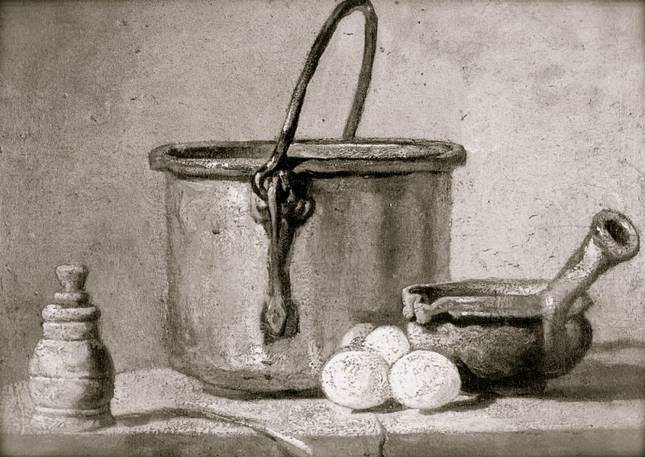


For many of us Italian-Americans cuisine is poetry. It satisfies all five senses. What is better than the view of a set table, the taste of a cannolo, the touch of fresh, soft basil leaves, the smell of a dish of fettuccine with Bolognese sauce, the noise of pots and pans and all kinds of kitchen tools when we prepare our favorite recipes? They make you close your eyes, breath deep... and feel good.
I never thought that the love for food could be expressed with words, at least not through-and-through. I kind of changed my idea when I first red “Ode to the artichoke” by Pablo Neruda.
The artichoke With a tender heart
Dressed up like a warrior,
Standing at attention, it built
A small helmet Under its scales
It remained Unshakeable,
By its side
The crazy vegetables
Uncurled Their tendrils
and leaf-crowns,
Throbbing bulbs,
In the sub-soil
For many years I never came along anything like this anymore. I thought it was the only case of an ode to food put in rhyme. That was until I read “The poet’s cookbook” by “chefs” Grace Cavalieri and Sabine Pascarelli: a comprehensive collection of Tuscan recipes accompanied by 28 poems composed by Italian and American writers and dedicated to the pleasures of cooking and the Italian passion for culinary traditions.
Published by the Italian-American publishing house Bordighera Press, the book is divided into seven chapters, according to the different courses: “Appetizers-Antipasti”, “Soups-Minestre”, “First Courses – Primi Piatti”, “Second Courses – Secondi Piatti”, “Vegetables – Verdure”, “Salads – Insalate”, “Desserts – Dolci”, each one of which features a number of poems on the theme.
The first thing that I appreciated about the book was the total respect the authors showed towards authentic Italian cuisine. I recognize all of them for being “original Italian – and Tuscan – traditional recipes”. Reading the ingredients and the preparation instructions of some of them just made my mouth water. I also found some of my favorites, including “Porcini in umido con polenta” (Sauted porcini with Polenta), “Ribollita” (a soup made with different kinds of vegetables, beans and old bread), “Brasato al Barolo” (Meat cooked in a Barolo wine sauce), and “Cantucci” (hard almond and nut cookies typical of the area of Siena, near Florence).
The poems that accompany these delicious recipes are exquisite as well! Some of them are dedicated to a single food, such as “Pear” by Linda Pastan:
(…) Why else the fruit itself
tawny and sweet
which your lover
over breakfast lets go your pear-
shaped breast
to reach for?”
Others perfectly describe the atmosphere, joy, and pleasure of being together felt in an all Italian or an Italian-American household when the whole family is sitting around the table. In “Sunday”, as an example, Anne Caston says:
“Here is a genial congregation,
well fed and rosy with health and appetite,
robust children in tow. They have come
and all the generations of them to be fed,
their old ones too who are eligible now
for a small discount, having lived to a ripe age.
Over the heaped and steaming plates, one by one,
heads bow, eye close: the blessings are said”.
“There are many standard national cookbooks in English and Italian. However, we wanted to share recipes that were once purely Italian and are now also becoming American. Because we came to our friendship through poetry and cooking, we offer some of each in this book. Cooking speaks of community, in Italy and in America; and the breaking of bread in any language, in every country, speaks of a fellowship with others. In this spirit, although the recipes are our own, we asked that the poems included be from our friends, other poets”, said Mrs. Cavalieri and Mrs. Pascarelli explaining the reasons that brought them to the writing of this book.
Poets Grace Cavalieri and Sabine Pascarelli translated all the poems they collected. Mrs. Cavalieri has written several books of poetry herself and 21 produced plays. She founded “The Poet and the Poem” aired on public radio and now celebrating its 33rd anniversary. She also produces the series “From the library of Congress”.
Mrs. Pascarelli’s family, on the other hand, is settled in Tuscany. She is a visual artist, a poet, and a translator of English, German, and Italian. Among the works she translated, “Alchengy of Grief”, which won the Bordighera Poetry Prize in 2006.
Source URL: http://ftp.iitaly.org/magazine/dining-in-out/articles-reviews/article/ode-italian-cuisine
Links
[1] http://ftp.iitaly.org/files/pentole-rame-copia1263592263jpeg
[2] http://www.gracecavalieri.com
[3] http://www.bordigherapress.org